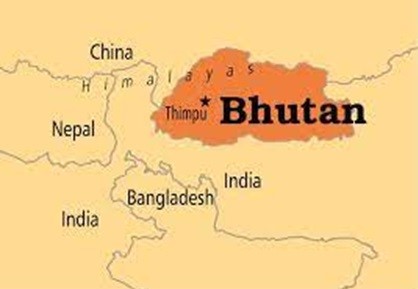Context
India's "Neighbourhood First" policy has been exemplified through its longstanding relationship with Bhutan. Despite vast differences in size and population, the bond between these two nations has flourished over the past five decades. The key lies in mutual respect, where both countries treat each other as equals. This foundation of respect has fostered a deep trust between India and Bhutan, leading to collaborative efforts for mutual prosperity and development. One of the hallmarks of this relationship is the emphasis on understanding and preserving Bhutan's unique identity and traditions while promoting economic growth.
The Gelephu Project
Recently, Bhutan's King hinted at plans for a Mindfulness City in Gelephu, Bhutan, during his visit to India. This visionary project aims to create a Special Economic Zone focused on attracting foreign investment while prioritizing sustainability and well-being. India is expected to play a significant role in this endeavor, aligning with its commitment to supporting Bhutan's economic growth. The proposed Gelephu Mindfulness City embodies a holistic approach, emphasizing human well-being through yoga, spa therapies, and environmental consciousness. The ongoing dialogue and cooperation between the leadership of Bhutan and India underscore the commitment to nurturing this unique partnership.
The recent visit of Bhutan's Prime Minister to India, followed by Prime Minister Narendra Modi's forthcoming visit to Bhutan, signifies the importance both nations place on maintaining strong bilateral ties. Such reciprocal visits demonstrate the commitment to continuous dialogue and cooperation, essential for the growth and prosperity of both countries. The attention given to nurturing this relationship echoes India's Neighbourhood First policy, reaffirming its dedication to fostering strong bonds with neighboring nations.
The Anchor of Hydropower Cooperation
Hydropower cooperation serves as a cornerstone of the relationship between India and Bhutan, symbolizing their shared commitment to sustainable development. Collaborative efforts have led to the successful completion of several hydroprojects, providing clean electricity to India and generating revenue for Bhutan. This cooperation has been instrumental in Bhutan's transition from a Least Developed Country status, highlighting the tangible benefits of bilateral collaboration. Despite challenges, such as delays in the Punatsangchhu-II hydropower project, the government-to-government model of cooperation remains robust, ensuring the continued success of joint ventures in hydropower.
In recent years, attempts to introduce a new joint venture model for hydroprojects have faced obstacles, indicating the need for reevaluation. Acknowledging these challenges, both nations must revisit their strategies to develop a more pragmatic approach for future hydroprojects. India's significant role as a development assistance partner to Bhutan, evidenced by its substantial contribution to Bhutan's 12th Five Year Plan, underscores the importance of aligning assistance with Bhutanese priorities. This collaborative approach, focused on mutual benefit, has been pivotal in fostering a prosperous partnership between New Delhi and Thimphu.
Measures to Consider
Looking ahead, India has a vital role to play in the success of the Gelephu Mindfulness City project. Initiatives such as establishing direct flights between major Indian cities and Gelephu, sharing technological expertise for infrastructure development, and encouraging Indian businesses to invest in the city can significantly contribute to its success. Moreover, promoting tourism and business ventures in Gelephu will not only benefit Bhutan but also create positive socio-economic impacts in neighboring regions like West Bengal and Assam. These measures underscore the potential for win-win cooperation between India and Bhutan, further strengthening their bilateral relationship.
Conclusion
The enduring partnership between India and Bhutan exemplifies the spirit of cooperation and mutual respect, forming the cornerstone of India's Neighbourhood First policy. Through collaborative efforts in areas such as hydropower cooperation and economic development projects like the Gelephu Mindfulness City, both nations have demonstrated their commitment to each other's prosperity. As they navigate future challenges and opportunities, continuous dialogue, and innovative strategies will be essential in deepening this unique bond further. India's unwavering support for Bhutan's priorities and development aspirations underscores the strength of this enduring friendship, setting a positive example for regional cooperation and diplomacy.
|
Probable Questions for UPSC Mains Exam 1. Explain the importance of hydropower cooperation between India and Bhutan. Discuss the challenges in implementing joint ventures for hydroprojects and suggest strategies for improvement. 2. Assess the factors driving the enduring partnership between India and Bhutan. How can initiatives like the Gelephu Mindfulness City project foster sustainable development and regional cooperation in South Asia? |
Source – The Hindu







